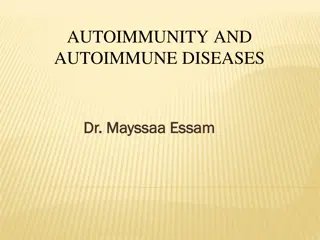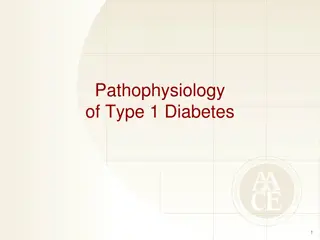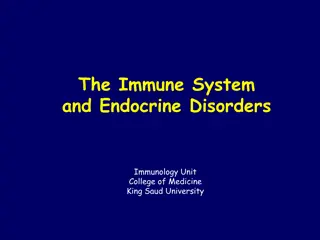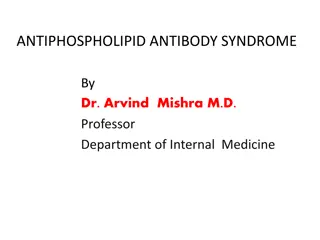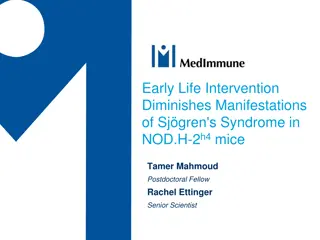Understanding Autoimmunity and Autoimmune Disorders
Autoimmunity refers to the immune system's failure to recognize its own cells, leading to attacks on self-tissues. Autoimmune disorders encompass over 80 chronic illnesses where the immune system mistakenly targets organs. These disorders are poorly understood and recognized, impacting various organ
1 views • 20 slides
Understanding Type 1 Diabetes Pathophysiology and Etiology
Type 1 diabetes is characterized by absolute insulin deficiency, resulting from pancreatic beta cell destruction. It is prone to ketosis with a total deficit of circulating insulin, often due to autoimmune factors. The pathophysiology involves inflammation, immune-mediated cell destruction, and a ch
0 views • 13 slides
Understanding the Interplay of the Immune System and Endocrine Disorders
Explore the intricate mechanisms of immunological damage to endocrine glands, focusing on disorders like Graves disease, Hashimoto's thyroiditis, type I diabetes, and Addison's disease. Delve into the association of autoantibodies with pathogenic and diagnostic significance, uncovering the complexit
0 views • 33 slides
Understanding Antiphospholipid Antibody Syndrome and Its Clinical Implications
Antiphospholipid antibody syndrome is an acquired disorder characterized by recurrent thrombosis or pregnancy complications due to autoantibodies against phospholipid-binding plasma proteins. Learn about its classification, epidemiology, pathogenesis, and diagnostic antibodies. Discover how lupus an
0 views • 35 slides
Early Life Intervention Diminishes Sjögren's Syndrome Manifestations in Mice
Early life intervention has been shown to reduce the clinical manifestations of Sjögren's syndrome in NOD.H-2h4 mice, which mimic key features of the human autoimmune disease. The syndrome is characterized by salivary gland autoantibodies, ectopic lymphoid follicles, reduced salivary and tear flow,
0 views • 19 slides
